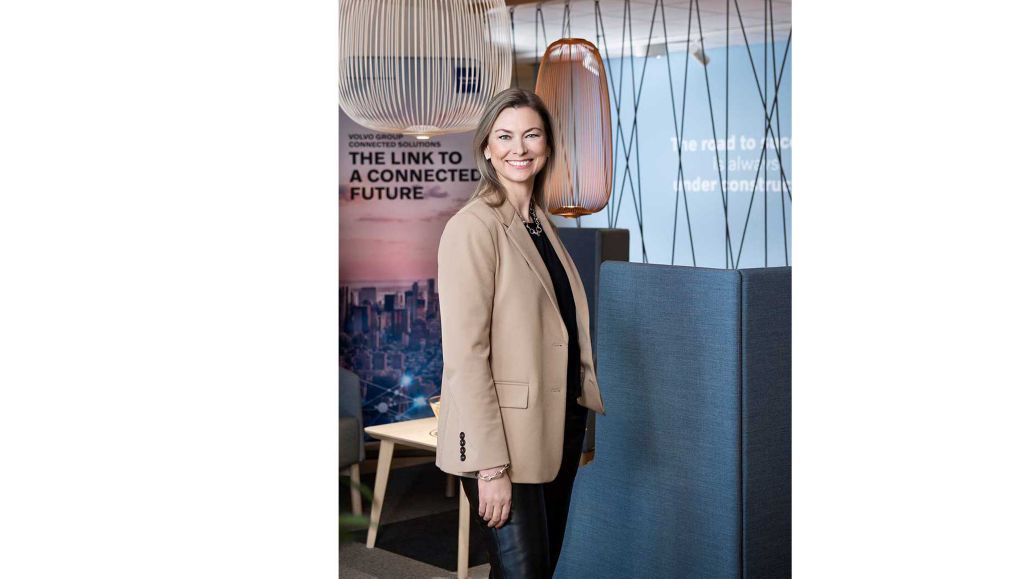Connectivity for customised transport


“This is an exciting time. A lot of things are happening and new technologies are transforming the entire value chain,” says Victoria Woyland, Vice President of Volvo Group Connected Solutions, which is developing solutions and services for connected trucks, buses, machines and engines.
In addition to supplying competitive new services and solutions, Volvo Group Connected Solutions is also working with customers, partners and other companies in the Volvo Group to create innovative services.
“At Volvo Group Connected Solutions, big data is the focus of our day-to-day work. By collecting data from customers’ connected vehicles all over the world, we can analyse their behaviour and, on that basis, develop the digital services of tomorrow. Developments are currently being driven by three technologies: connectivity, automation and electrification. These are all software-based and digitalisation will play a fundamental role in the development of these technologies and the creation of new added value,” explains Victoria Woyland.
Strong customer focus
The Volvo Group puts the emphasis on its customers’ expectations and requirements and on developing solutions together with customers. The new technologies make it possible to customise solutions to meet users’ specific needs and, at the same time, to reuse the fundamental architecture and components in an efficient and scalable way.
“At Volvo Group Connected Solutions we take a highly solution-oriented approach and work closely with our customers. The user experience is central to what we do. Digitalisation also allows us to enter into partnerships and take part in open ecosystems,” says Victoria Woyland. “Together with connectivity and other technologies, digitalisation plays a key role in increasing transparency along the entire value chain in what is otherwise a fragmented transport industry.”
Artificial intelligence
AI is a technology that opens up new opportunities. It is also an essential requirement for autonomous vehicles and for transforming data into added value for customers, for example for functions such as fault prediction, adaptive cruise control and automated braking. The more than one million connected trucks, buses and construction machines belonging to the Volvo Group’s customers represent a valuable asset for the group.
“The data provides us with valuable information about how our products are being used and this allows us to offer our customers services and solutions that are relevant to them.”
The quantity of data that is being generated will continue to grow and making correct use of this to develop more services is a gradual process. One central issue is sustainability and producing vehicles that meet the increasingly stringent emissions regulations. It takes time to convert an entire fleet and to develop new, zero-emission models. Over the next five to ten years, the regulations will be tightened up significantly on a national and an EU level. Volvo is at the cutting edge of research and development relating to sustainable solutions along the entire value chain.
“This is an agenda that is not under our control. Developments are being made on the basis of legislation and the needs of society as a whole. It is difficult to say when we will achieve zero emissions, but this will probably come more quickly for heavy goods vehicles than for cars,” says Victoria Woyland.
Major demand for skills
The big changes taking place in the automotive industry are leading to significant demand for IT skills. Some of the employees that are needed include developers, UX designers, data analysts, cyber-security experts, cloud computing specialists and IT architects.
“Employees’ personal skills are also important. In this rapidly changing environment, we need flexibility, problem-solving abilities and the determination to grow from a professional perspective,” emphasises Victoria Woyland. “For us as an employer, it is essential to be able to attract and retain skilled people. At Volvo Group Connected Solutions, our business and our leadership are value-based and we put a lot of emphasis on enabling our employees to develop within their roles and giving them the best possible environment to work in. Together we will drive the development of new technologies and make our mark on society.”
Read more about Volvo Group Connected Solutions